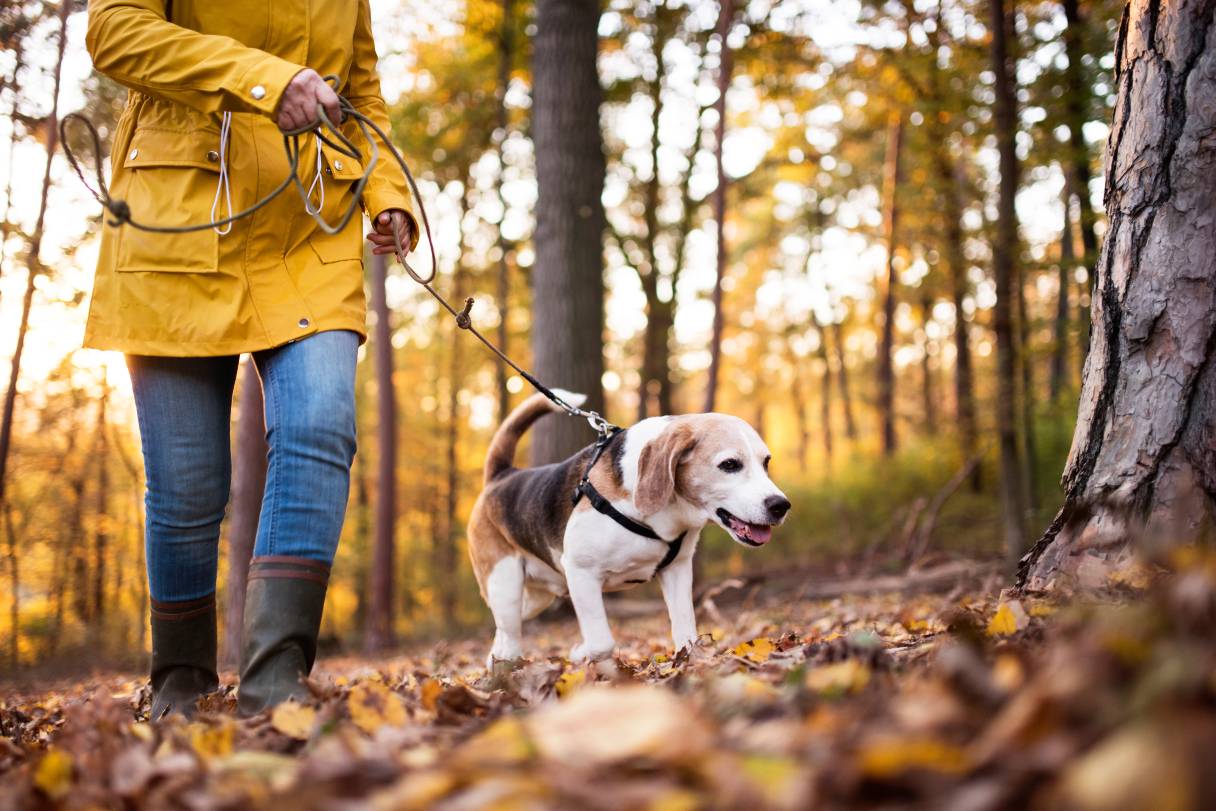Similar to the anterior cruciate ligament (ACL) in humans, the canine cranial cruciate ligament (CCL) is an important structure that stabilizes your dog’s knee joint.1 The CCL helps connect the femur (thigh bone) to the tibia (shin bone).2 Unlike humans — whose ACL can tear as a result of a traumatic injury — a dog's CCL tear is usually due to the ligament weakening or deteriorating over months or even years and then partially or completely rupturing from running or jumping.2
The condition often affects both knees, with studies showing that more than 50% of dogs will experience a CCL rupture in the opposite limb after the initial injury.1
The tearing or rupture of this ligament is one of the most common reasons for hind limb lameness, pain and knee arthritis in dogs.1 Learn more about what treatment options are available and how much it may cost you at the vet's office.
What Causes a Cranial Cruciate Ligament (CCL) Rupture?
A partial or complete rupture of the CCL can be caused by a variety of factors. In most cases, a rupture of this ligament occurs due to a gradual degeneration of the ligament over time rather than a sudden traumatic injury.1
Factors contributing to CCL injuries in dogs include:1
- Aging
- Obesity
- Poor physical condition
- Conformation
- Breed (this condition mostly affects larger breeds, such as rottweilers, Staffordshire bull terriers, bullmastiffs, Akitas, and Saint Bernards)
Genetic inheritance has been shown in Newfoundlands.1
It's important to note that a dog that experiences a CCL rupture in one leg is likely to experience it in the opposite leg as well. About 50% of dogs with cranial cruciate ligament disease (CCLD) in one knee may, at some point, develop similar problems in the other knee.1 Pet owners should be aware of this probability and prepare for the additional expense.
Symptoms of a Dog CCL Rupture
Because progressive degeneration is the main cause of a rupture, you may not notice any lameness in your dog at first. One of the initial signs is that your dog may sit with their legs out to the side instead of square. Other signs may include:1
- Difficulty standing up
- Trouble jumping
- Decreased activity level or unwillingness to play
- Decreased range of motion
- A popping noise
- Swelling on the inside of the shin bone
- Lameness in a hind leg or refusal to put weight on their leg
If the lameness or pain lasts for longer than a day or two, it’s recommended that you contact your veterinarian.1
Diagnosis of a Dog CCL Rupture
Your veterinarian will palpate (move around) your dog’s knee to feel for the cranial drawer motion. It doesn’t hurt your dog, but if your dog is too tense, a sedative may be required. Your veterinarian will likely suggest a diagnostic test, such as an X-ray, to rule out other conditions and determine the best treatment for your dog.
What's the Difference Between ACL vs. CCL?
ACL is a human medical term and is commonly used incorrectly when discussing similar injuries in dogs. The correct term in veterinary medicine is CCL. Veterinary anatomy uses the terms cranial/caudal; human medicine uses the terms anterior/posterior.
While they are similar in function, a human anterior cruciate ligament tear is not the same as a canine cranial cruciate ligament rupture. So, while some owners like to think of it as an ACL tear, calling it that wouldn't be accurate.
How Much Does CCL Surgery for a Dog Cost?
The national average cost* of CCL Surgery (tibial plateau leveling osteotomy) for a dog is $3,525 but ranges anywhere from $2,793 to $6,417 depending on your location.3 Other costs to consider include aftercare, such as canine rehabilitation and medications.
Average dog CCL surgery cost by state/district3
Below are the average costs* of CCL Surgery (tibial plateau leveling osteotomy) by state:3
| State/District | Average cost |
|---|---|
| Alabama | $2,948 |
| Alaska | $4,167 |
| Arizona | $3,658 |
| Arkansas | $2,922 |
| California | $4,701 |
| Colorado | $3,576 |
| Connecticut | $3,787 |
| Delaware | $3,465 |
| District of Columbia | $4,781 |
| Florida | $3,474 |
| Georgia | $3,111 |
| Hawaii | $6,332 |
| Idaho | $3,458 |
| Illinois | $3,196 |
| Indiana | $3,055 |
| Iowa | $3,022 |
| Kansas | $2,926 |
| Kentucky | $3,133 |
| Louisiana | $3,122 |
| Maine | $3,691 |
| Maryland | $3,883 |
| Massachusetts | $4,906 |
| Michigan | $3,048 |
| Minnesota | $3,233 |
| Mississippi | $2,830 |
| Missouri | $3,000 |
| Montana | $3,488 |
| Nebraska | $3,170 |
| Nevada | $3,440 |
| New Hampshire | $3,794 |
| New Jersey | $3,875 |
| New Mexico | $3,174 |
| New York | $4,182 |
| North Carolina | $3,277 |
| North Dakota | $3,118 |
| Ohio | $3,192 |
| Oklahoma | $2,889 |
| Oregon | $3,772 |
| Pennsylvania | $3,225 |
| Rhode Island | $3,816 |
| South Carolina | $3,236 |
| South Dakota | $3,126 |
| Tennessee | $3,066 |
| Texas | $3,126 |
| Utah | $3,495 |
| Vermont | $3,887 |
| Virginia | $3,403 |
| Washington | $3,868 |
| West Virginia | $2,834 |
| Wisconsin | $3,259 |
| Wyoming | $3,214 |
Does Pet Insurance Cover CCL Surgery for Dogs?
Pet insurance may cover some or all of the cost of cranial cruciate ligament surgery, unless your pet's CCL rupture was considered a preexisting condition. Be sure to check your policy or contact your insurance provider to find out whether your pet's surgery will be covered.
Most pet insurance companies will require you to pay for the surgery out of pocket and will then reimburse you, so you will still need to be prepared to cover the cost of your pet's surgery up front.
Potential Side Effects of CCL Surgery for Dogs
Complications with any surgical techniques include:1
- Adverse reaction to anesthesia
- Excessive bleeding2
- Infection
- Patellar luxation (kneecap dislocation)
- Progressive arthritis
- Failure to return to normal activity (e.g., a lingering limp)
Specific complications of CCL surgery include:1
- Delayed healing of the bone
- Non-healing of the bone
- Healing in the incorrect position
- Bone fracture
- Breaking of the screws or plates
These complications may require another surgery but are rare when the procedure is performed by an experienced surgeon and when follow-up protocols are followed.1
Recovery From CCL Surgery: Tips and Timing
The long-term prognosis for CCL surgery is good, and veterinarians typically see improvement in 85% to 90% of cases. Arthritis will progress regardless of treatment, and management and prevention is recommended for any dog with CCLD.1
Regardless of the surgical procedure, your dog will likely require at least three months of exercise restriction: leash walks only, no running and no jumping. Physical therapy and rehabilitation is often recommended, and most dogs can return to normal activity in three to four months after ensuring the bone has healed completely and the muscle has been rebuilt. It’s important to follow all restrictions to avoid complications and multiple surgeries.2
Financing CCL Surgery With the CareCredit Credit Card
Your dog is your best friend, and you want to make sure they get the very best. That's why the CareCredit credit card is here to help you manage the costs of diagnostics and treatment for conditions like cranial cruciate ligament disease.** Use our Acceptance Locator to find a veterinarian near you that accepts CareCredit. CareCredit is there for you and your pet every step of the way; continue your wellness journey by downloading the CareCredit Mobile App to manage your account, find a provider on the go and easily access the Well U blog for more great articles, podcasts and videos.
In addition to pet care, you can also use your CareCredit credit card for dentistry, cosmetic, vision, hearing, health systems, dermatology, pharmacy purchases, spa treatments and so much more within the CareCredit network. How will you invest in your health and wellness next?
Expert Reviewer
Dr. Kathy Wiederkehr (Wentworth), V.M.D.
Dr. Kathy Wiederkehr (Wentworth) has been practicing veterinary medicine at pet care facilities in California since 2001. Most recently, she served as medical director of the VCA PetPoint Medical Center and Resort in Irvine. She is a graduate of the University of Pennsylvania School of Veterinary Medicine and became board-certified as a diplomate in Canine and Feline Practice by the American Board of Veterinary Practitioners in 2010.
Author Bio
Abbie Mood is a freelance writer with more than 10 years of experience. She has worked with clients of all sizes to create compelling content and she has written for the American Kennel Club, Marriott Bonvoy, Women's Health Online, Headspace and more.








